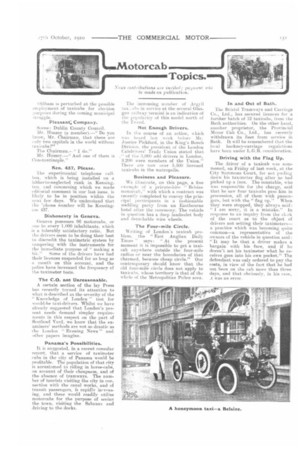hlotorcab
Page 3

If you've noticed an error in this article please click here to report it so we can fix it.
Topics.
Nacs contributions are invited : payment witi be made on publication.
()Milani is perturbed at the possible employment of taxicabs for election purposes (luring the coming municipal L Pleasant; Company.
Scene: Dublin County Council.
Mr. Hussey (a member).—" Do you know, Mr. Chairman, that there are (lily two capitals in the world without T :IN icabs ?"
The Chairman.—•" I do."
Mr. Tfussey.—' And one of them is Constantinople."
Ken. 457, Please.
'the experimental telephone callbox; which is being installed on a hitherto-neglected rank in Kensington, and concerning which we made editorial comment in our last issue, is likely to be in position within the Lc t few days. We understand that the 'phone number will be Kensingtoe 437.
Dishonesty in Geneva.
Geneva possesses 96 motoreabs. or line to every 1,000 inhabitants, which is a tolerably satisfactory ratio. But the drivers seem to be doing their best to discredit the taximetric system by tampering with the instruments for the immediate purpose of " making a bit." Some of the drivers have had their licences suspended for as long as a month on this account, and the police have increased the frequency of the taximeter tests.
The C.O. not Unreasonable.
A certain section of the lay Press has recently turned its attention to what is described as the severity of the " Knowledge of London " test for would-be taxi-drivers. Whilst we have already suggested that London's present needs demand simpler requirements in this respect on the part of Scotland Yard, we know that the examiners' methods are not so drastic as the London " Evening News" and other papers imagine.
Panama's Possibilities.
It is suggested, in a recent consular report, that a service of taximeter cabs in the city of Panama would be profitable. The population of that city is accustomed to riding in horse-cabs. on account of their cheapness, and of the absence of tramways. The number of tourists visiting the city in con. nection with the canal works, and of transit passengers, cs rapidly inereasing, and these would readily utilize motercabs for the purpose of seeing the town, visiting the Sabanas and .driving to the docks.
The increasing number of Argyll taxi,-abs in service at the several Glasgow railway termini is an indication of the popularity of this model north of the Tweed.
Not Enough Drivers.
In the course of an action, which was heard last %veek Irefore Mr. Justice Pickford, in the King's Bench Division. the president of the London Cabdrivers' Trade Union stated that -of the 5,000 odd drivers in London, 3,200 were members of the Union." There are now over 5,500 licensed taxicabs in the metropolis.
Business and Pleasure.
We illustrate, on this page, a fine example of a private-hire " Belsize raotorcab," with which a contract was recently completed to convey the principal participants in a fashionable wedding party frotn an Eastbourne hotel after the ceremony. The vehicle in question has a deep landaulet body and detachable wire wheels.
The Four-mile Circle.
Writing of London's taxicab problem. the " East Anglian Daily Times' says: "At the present moment it is impossible to get a taxicab anywhere outside the four-mile radius or near the boundaries of that charmed, because cheap circle." Our contemporary should know that the old four-mile circle does not apply to taxicabs, whose territory is that of the whole of the Metropolitan Police area.
In and Out of Bath.
The Bristol Tramways and Carriage Co., Ltd., has secured licences for a further batch of 12 taxicabs, from the Bath authorities. On the other hand, another proprietor, the Provincial Motor Cab Co., LW., has recently withdrawn its fleet from service in Bath. It will be remembered that the hackney-carriage regulations have been under L.G.B. consideration.
Driving with the Flag Up.
The driver of a taxicab was Summaned, on Friday of last week, at the City Summons Court, for not pulling down his taximeter flag after he had picked up a fare. The constable, who was responsible for the charge, said that he saw four taxicabs pass him in procession, all of them with passengers, but with the " flag up." When they were stopped, they always said: I am sorry, it is a mistake." In response to an inquiry from the cicrk of the court as to the object of drivers not setting their taximeters— a practice which was becoming quite common—a representative of the owners of the vehicle in question said: "It may be that a driver makes a bargain with his fare, and if he doesn't set his taximeter what he receives goes into his own pocket." The defendant was only ordered to pay the costs, in view of the fact that he had not been on the cab more than three days, and that obviously, in his case, .t was an error.




















